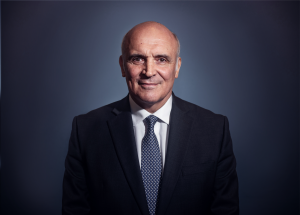It is the beginning of summer in Argentina, and the stagnant economy is showing a few tiny signs of life which beleaguered Argentines are calling the "veranito" or "little summer". But some economists say, while these signs are positive, Argentina still has a long way to go before recovering from its deepest depression in a century.
Hand-pushed carts filled with produce rumble through the cavernous central market in Buenos Aires, past stacks of boxes and stands filled with fruits and vegetables. The hectic activity and the shouts of sellers and buyers echoing through the vast warehouses are a sign that business is brisk.
Fruit seller Tomas Barcone says his sales are up by 40 percent from a year ago mainly because he can now export his produce, which once was too expensive to be competitive. Argentina, which had its currency pegged at par with the dollar for almost ten years, was forced to devalue the peso early this year because of its economic crisis. This devaluation of over 70 percent has helped fruit exporters like Tomas Barcone.
"Citrus exports have been reactivated," he said. "Lemons, oranges and tangerines are now going to Europe and Asia. We’re selling apples to Brazil," he said. "But that country’s devaluation may affect those sales."
Mr. Barcone says the jump in exports has helped revive the fruit and vegetable farms in the interior of the country. However, he acknowledges domestic consumption is still low because of the economic crisis.
At the Whirlpool plant in the western province of San Luis, workers at an assembly line mount refrigerators for sale overseas. Compared to the past, the plant only has one eight-hour shift. An indication of the continuing economic slump. General Manager Victor Mario Leveroni acknowledges domestic demand for durable goods like refrigerators is low, but he hopes for an upturn next year.
"Things may begin to move by next April, if this slight pickup of the economy continues, and if the exchange rate remains stable," he said. Mr. Leveroni went on to say the effects of the peso devaluation have caused his plant to begin buying some of its parts domestically, instead of importing them from abroad. This in turn, he said, has stimulated the rise of small workshops and other businesses to supply Whirlpool. Though he adds the quality of these local products needs to be improved.
All these are indications that the Argentine economy may have stopped its slide, and is showing some small signs of revival. The latest figures show economic activity grew by nine-tenths of one percent in August and exports were up as well. Consumer price increases slowed in October to eight-tenths of one percent. Compared to a high in April of 10 percent because of the devaluation. Meanwhile, the peso’s value against the dollar has remained steady for the past three months, boosting consumer confidence.
The sense that the Argentine economy may have bottomed out has coincided with the advent of summer in the South American nation, giving rise to the term "veranito", or "little summer" used by Argentines looking for any sign of hope in the depressed economy. But economic consultant Jose Luis Espert says the small upsurge of business activity does not change the overall dismal situation. He predicts the Argentine economy will shrink by up to 14 percent this year adding he is not even sure if the decline has bottomed out.
"I think that the GDP reached its bottom in the third quarter of 2002," he said. "The question is whether from this bottom we will experience some kind of recovery, or will we begin to decline after that. I think perhaps in the short-run, in the following year, we’ll experience some kind a recovery of 0.5 percent, or one percent. But I don’t think this is the issue right now. I think Argentina needs to begin to grow at a sustainable and very significant growth rate, and one of the necessary conditions is to change dramatically what Argentina has been doing for the last 60 years".
Argentina, once the richest country in Latin America, has seen its standard of living decline since the 1940s. Economists blame policies such as heavy overseas borrowing, the nationalization of industries and the expansion of government and state services.
Some of these policies were reversed during the 1990s, and the economy began to expand again. But by the turn of the century, Argentina was once again in recession.
Per capita income, once a high of almost $9,000 dollars, is now down to an estimated $2,500 dollars. Because of the peso devaluation, salaries have declined by 73 percent and are now the lowest in Latin America.
Economist Espert says Argentina needs dramatic changes in its political system, education, and macro-economic policies if it ever hopes to achieve sustained economic growth.
"I think if Argentina doesn’t change dramatically we will be discussing in the following year: ‘we’re growing at one percent and the poverty rate will be 60 percent, and the unemployment rate will be 20 percent;’ it will not change dramatically the situation right now. We have reached the bottom but we are very poor right now".
One sign of Argentina’s continuing economic plight is the death of six children this past week of malnutrition in a northern province.
Government statistics show almost nine million, or about 70 percent, of Argentine children live in poverty. Economists say it will take years of sustained economic growth to make any substantial improvements.
The "veranito" or "little summer" may turn out to be just that, a short break from the long winter of economic depression.

